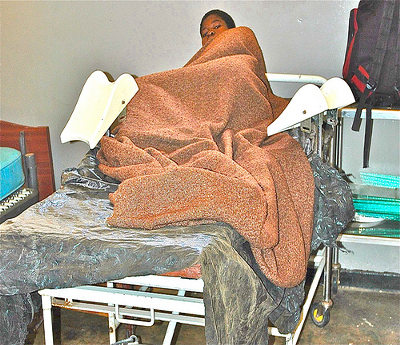
With the breakdown in medical care, and a plea for help that is often unheard, it is not surprising to enter hospitals where there are not enough beds, not enough mattresses, not enough medications, not enough supplies, and not enough doctors, nurses, and staff. But it is surprising what one can find that still leaves the western visitor speechless, and questioning where the rest of the world is when it comes to the needs of Africa.
The picture was taken in the surgery room of a small rural hospital in central Malawi. The woman under the blanket was about to deliver a baby. Under her was a black, dirty, trash bag! When the lone nurse was asked how this could be the case in a part of the hospital where good care, a sterile environment, and the best supplies needed to be available, she explained they did not have sufficient supplies to care for the patients. In fact, each patient was required to bring a plastic bag when they came to deliver. They also had to bring a sharp blade with which to cut the umbilical cord after birth.
The imagine of a woman about to experience one of the pinnacle moments in life, the birth of her first child, while laying on a trash bag hangs heavy on the hearts of those who saw it. It will probably remain for years to come, or until enough supplies are sent to Malawi to allow women to delivery babies in a clean place, with the proper supplies, and with the dignity they deserve.
By Richard Stephens
Malawi Project, Inc.
